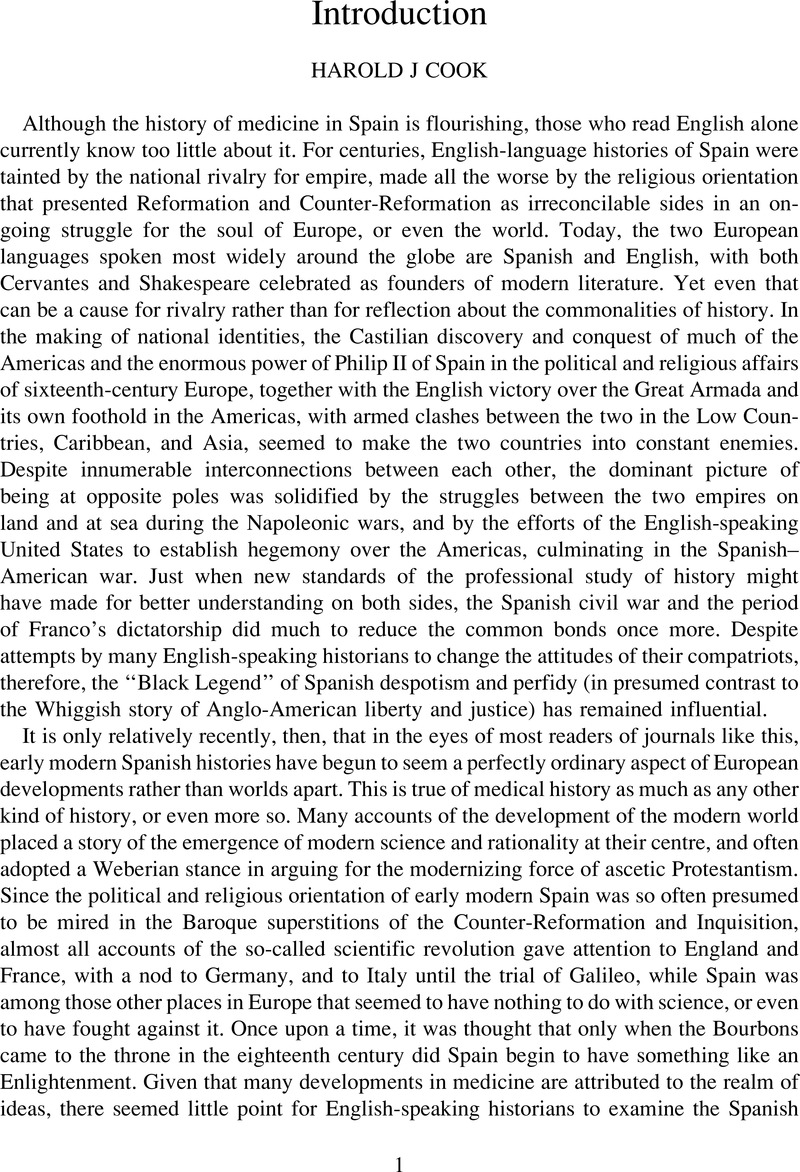No CrossRef data available.
Article contents
Abstract

- Type
- Introduction
- Information
- Copyright
- Copyright © The Author(s) 2009. Published by Cambridge University Press
References
1For example, José María López Piñero, Medicina moderna y sociedad española: siglos XVI–XIX, Valencia, Cátedra e Instituto de Historia de la Medicina, 1976; idem, Ciencia y técnica en la sociedad española de los siglos XVI y XVII, Barcelona, Labor Universitaria, 1979. Efforts were also made to make his views available in English, as in López Piñero, ‘The medical profession in sixteenth-century Spain’, in Andrew W Russell (ed.), The town and state physician in Europe from the Middle Ages to the Enlightenment, Wolfenbüttel, Herzog August Bibliothek, 1981, pp. 85–98, and his ‘Eighteenth-century medical vitalism: the Paracelsian connection’, in William R Shea (ed.), Revolutions in science: their meaning and relevance, Canton, MA, Science History Publications, 1988, pp. 117–32.
2John Tate Lanning, The Royal Protomedicato: the regulation of the medical professions in the Spanish empire, ed. John Jay TePaske, Durham, Duke University Press, 1985; Guenter Risse, ‘Medicine in New Spain’, in Ronald L Numbers (ed.), Medicine in the New World: New Spain, New France, and New England, Knoxville, University of Tennessee Press, 1987, pp. 12–63.
3David C Goodman, Power and penury: government, technology, and science in Philip II’s Spain, Cambridge, Cambridge University Press, 1988.
4See Luis García-Ballester, Los moriscos y la medicina: un capítulo de la medicina y la ciencia marginadas en la España del siglo XVI, Barcelona, Labor Universitaria, 1984; and for examples of his work in English: ‘ Academicism versus empiricism in practical medicine in sixteenth-century Spain with regard to morisco practitioners’, in Andrew Wear, Roger K French, and Ian M Lonie (eds), The medical Renaissance of the sixteenth century, Cambridge, Cambridge University Press, 1985, pp. 246–70, 338–42; ‘Dietetic and pharmacological therapy: a dilemma among fourteenth-century Jewish practitioners in the Montpellier area’, Clio Medica 22, Essays in the history of therapeutics, ed. W F Bynum and V Nutton, Amsterdam, Rodopi, 1991, pp. 23–37; ‘The Inquisition and minority medical practitioners in Counter-Reformation Spain: Judaizing and morisco practitioners, 1560–1610’, in Ole Peter Grell and Andrew Cunningham (eds), Medicine and the Reformation, London and New York, Routledge, 1993, pp. 156–91; with Michael R McVaugh and Agustín Rubio-Vela, ‘Medical licensing and learning in fourteenth-century Valencia’, Transactions of the American Philosophical Society, 1989, 79, pt. 6; and with Lola Ferre and Eduard Feliu, ‘Jewish appreciation of fourteenth-century scholastic medicine’, Osiris, 1990, 2nd series, 6: 85–117, within the monographic issue ‘Renaissance medical learning: evolution of a tradition’, edited by Michael R McVaugh and Nancy G Siraisi.
5See, for example, Daniela Bleichmar, Paula De Vos, Kristin Huffine, and Kevin Sheehan (eds), Science in the Spanish and Portuguese empires, 1500–1800, Stanford, Stanford University Press, 2009; Jorge Cañizares-Esguerra, Nature, empire, and nation: explorations of the history of science in the Iberian world, Stanford, Stanford University Press, 2006; Antonio Barrera-Osorio, Experiencing nature: the Spanish American empire and the early scientific revolution, Austin, University of Texas Press, 2006.




